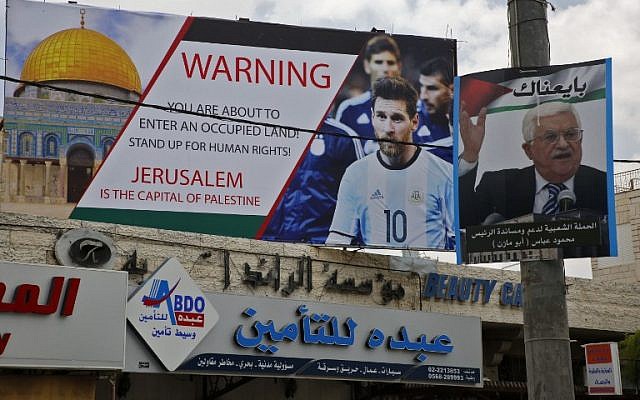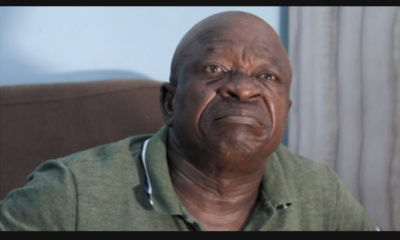Sports
Argentina cancels friendly match with Israel amid death threats against Messi
Argentina’s national soccer team announced Wednesday it was canceling a friendly match against Israel’s national team amid political pressure and after facing death threats, which the Argentine foreign minister said were “worse than ISIS.”
The announcement brought bitter disappointment for some 30,000 Israeli fans who had purchased tickets to the highly anticipated match set for Saturday and drew condemnations from Israeli leaders who accused the Palestinians of using “terrorism” to halt the contest.

For Palestinians and their supporters, however, there was jubilation. The decision to withdraw from the game was seen as the biggest victory yet for the boycott, sanctions and divestment (BDS) movement. They praised the Argentine team for taking a stand against Israel and its often lethal treatment of the Palestinians.
But the official reason for the cancellation, given by Chichi Tapia, head of the Argentine Football Association, was that his players had faced serious threats, which forced them to cancel. He said the team would try to play in Israel at another time.
In an interview with Agencia Judia de Noticias, a Jewish news service, Argentine Foreign Minister Jorge Faurie said the threats had exceeded those of the Islamic State, also known as ISIS.
Images on social media showed protesters outside the team’s Barcelona practice facility waving Palestinian flags and soccer jerseys dabbed with red paint resembling blood stains.
In a news conference Wednesday, Israel’s minister of culture and sport, Miri Regev, said it was threats on star player Lionel Messi’s life, against his family and other members of the team that had prompted the team to cancel the game.
“The decision for cancellation is down to one reason, terrorism,” she said. “This is not a BDS event. We are talking about serious threats.”
Regev denied that the cancellation occurred because she had politicized the match by moving it from Haifa to Jerusalem, which she said, as Israel’s capital, was a more appropriate location. But Palestinians pointed out that the friendly was to be played in a West Jerusalem stadium that sits on the site of a former Palestinian village. Palestinians refuse to recognize Israeli sovereignty over the city, which most believe should be divided in a future peace treaty.
Jibril Rajoub, chairman of the Palestinian Football Association, said Regev’s claims were exaggerated. Speaking to an Israeli TV station, he said he did not make any threats and was involved only in peaceful protests. He said it was Regev who had politicized the match and emphasized that he would not have objected to the match taking place in Haifa.
“According to Minister Regev, the match was going to take place in Jerusalem in order to celebrate 70 years of the establishment of Israel, to make the Argentine national team visit occupied Jerusalem’s Old City and to boost Israeli propaganda efforts,” Rajoub said earlier at a news conference. “This is totally unacceptable, and we call upon FIFA to take note and action of this new attempt by the Israeli government to politicize a football match.” FIFA is world soccer’s governing body.
On Sunday at a protest outside the offices of the Argentine representation in Ramallah, Rajoub had called on “everyone to burn their Messi shirts and pictures and renounce him” if the contest went ahead.
The Israel Football Association also blamed Rajoub and said it would send an official complaint against his actions to FIFA.
“The association views with severity the physical and brutal threats that crossed every red line made by the head of the Palestinian association, Jibril Rajoub,” said Ofer Eini, the head of the Israel Football Association.
The match, just a week before the opening of the 2018 World Cup soccer tournament in Russia, was politically charged almost from the start. Besides moving it to Jerusalem, Regev also boasted that it was an incredible public relations coup for the country. She said that Messi would “kiss the Western Wall” and “shake hands with Prime Minister Benjamin Netanyahu,” too.
Tensions have been high between Israelis and Palestinians over the past few months, following a decision by President Trump to recognize Jerusalem as Israel’s capital and move the U.S. Embassy there from Tel Aviv. The move has been fiercely protested by Palestinians and seen as illegal by most of the world.
In addition, Israel has faced sharp international criticism for its lethal response to ongoing protests along its border with the Gaza Strip. Israel unilaterally withdrew from the Palestinian enclave in 2005. But after the militant Islamist movement Hamas, which has been labeled a terrorist organization by Israel and the United States, took control of the strip more than a decade ago, Israel imposed a land and sea blockade on the territory. Egypt also has kept its crossing into Gaza closed for much of the past 10 years.
A growing humanitarian crisis in Gaza has pushed its residents to start protesting. In late March, thousands began weekly protests demanding both a right to return to land that is now inside Israel and a solution to the crisis facing more than 2 million residents. Israel has said that Hamas has used these protests as cover to breakthrough the border fence and infiltrate into Israel.
On May 14, the day the U.S. Embassy was officially inaugurated in Jerusalem, tensions were further inflamed, and Israeli forces killed more than 60 Palestinian protesters and wounded thousands.
The images of Palestinians killed and injured juxtaposed with Trump’s daughter Ivanka at the central event opening the new embassy drew strong condemnation, and international calls to hold Israel accountable have increased.
The Palestinian Campaign for the Academic and Cultural Boycott of Israel welcomed Argentina’s cancellation of the match, saying it would have been “extremely unfriendly to human rights.”
“Playing with an apartheid state is a form of complicity, magnified by Israel’s recent horrific massacre in Gaza against unarmed protesters demanding their basic freedom, dignity and U.N.-stipulated refugee right of return,” said Omar Barghouti, co-founder of the BDS movement.
He said it was part of an Israeli policy of “sports-washing … using international sporting events to cover up its war crimes and egregious human rights violations against Palestinians.”
The BDS movement aims to pressure Israel into complying with international law vis-a-vis its policies toward the Palestinians by discouraging the purchase of Israeli goods, pressuring international companies not to conduct business in Israel and urging celebrities not to visit or perform in the country.
The Israeli government says that the boycott campaign actively promotes the country’s demise and denies Israel’s basic right to exist as a Jewish and democratic state. It has ramped up efforts in recent years to fight back against BDS. Last month, the Giro d’Italia international cycling event kicked off in Jerusalem.
-

 News1 day ago
News1 day ago“Only self!sh men are intimidated by women’s success, you should be happy that your woman is successful” – Actress Diva Gold to men
-

 Celebrity Gossip & Gist1 day ago
Celebrity Gossip & Gist1 day ago”Competition has started again” – Reactions trail Regina Daniels and co-wife, Laila’s posts about their husband, Ned Nwoko
-

 News8 hours ago
News8 hours agoINEC Speaks On Manipulating Edo Governorship Election
-

 Celebrity Gossip & Gist8 hours ago
Celebrity Gossip & Gist8 hours ago“Why It’s a sin to marry only one or two wives” – Nollywood actor, Uwaezuoke advises men








